Today I finished up the seventh E-rate seminar around the state of Oklahoma in series of ten workshops I’m leading. The following messages have been common in my web browser this week in the school districts who have hosted the seminars, prior to and following my presentation time…
Trying to access Twitter yesterday:
Trying to access Yahoo mail today:
Trying to access my digital curriculum website on PBwiki today:
Trying to access my blog site today:
As an aside, I noticed with a sarcastic spirit the grammatical error in the title bar of each of these browser windows. Rather than offering the challenge, “Your busted” these screens should read “You’re busted.” Apparently someone in an IT department needs a review the grammatical nuances of contractions.
Thankfully, I can access my Yahoo email and Twitter via my iPhone which is accessing the Internet via the cellular phone network outside the control of these local school districts.
When I opened the Skype application today on my laptop connected to the school’s network and it tried to login, the IP address assigned to the wireless access point I’m using was “quarantined” on the network. This was the screen I was shown when trying to subsequently visit a website:
The district I’m in today has a TippingPoint Intrusion Prevention System installed and configured which permits “quarantining” individual computer users in circumstances like this. If my computer was infected with malware (of course it is NOT since I’m using a Macintosh portable and there aren’t any viruses / worms / malware “in the wild” for Mac OS X computers– there are thousands “out there” for Windows-based systems) I would understand. Schools actually NEED the capability to track what is happening on their networks, and if a computer is infected with “bad stuff” the network administrators need to be able to identify/isolate which computer(s) are infected and then deny access to the Internet and the rest of the local area network for those computers.
Why should school districts and other organizations be able to do this, you ask? There are multiple reasons, but a prominent reason is that having malware infected computers running on your network can not only degrade available network bandwidth, it can also result in your organization’s entire range of IP addresses being “blacklisted” for sending mail. The result can be (and often is for schools) that ALL USERS on the organization’s computer network can receive email, but no one can SEND email because the address of the district’s SMTP server has been blacklisted. Getting removed from an email/spam blacklist can be a big hassle and take a long time. Websites like Spamhaus and Spamcop can help you identify whether or not your public IP address has been blacklisted, and suggest actions you can take to get your IP address (or IP range) removed from blacklists.
Let me be clear: I agree with the philosophy behind CIPA legislation in the United States and am glad schools and libraries receiving E-rate funding are required to have and enforce local policies for content filtering. There certainly ARE websites “out there” which should be blocked from access at school. Pornographic sites are a clear case in point.
The problem is, however, the technology tools which permit network administrators and school administrators to block access to pornography also permit them to block access to a much wider range of websites.
Why should my access to Twitter be blocked from school? Why should my access to ALL PBwiki websites be blocked? In some cases, the answer to this question is that school administrators are attempting to keep students ON TASK, rather than just away from inappropriate content. The ironic thing (which I have noted before) is that CIPA does not require school districts to block access to a specific blacklist of websites. No one tells the school district to block virtually all blog and many wiki websites. The local administration, or the organization paid to maintain the school’s content filter, makes that decision. In addition, there are inherent problems with parents and others pointing fingers of blame at school officials when their children intentionally try to access objectionable / offensive / inappropriate websites. School networks and discipline systems should support cultures of individual accountability, rather than cultures which attempt to prevent all potential “bad choices” by users of the network. That is “big brother” personified, and certainly not an environment supportive of the development of responsible, ethical, and self-reliant people.
In a purely analog world, censorship like this could be more visible. A book burning event was held in a public square, I think, to draw attention to the fact that the authorities not only philosophically opposed but physically opposed the reading of certain “banned works.”
In a digital world, censorship and content filtering like this is not as visible as a book burning event in the public square. The chilling effects of digital censorship on the sharing and communication of ideas can be just as severe, however.
There are good reasons for network administrators to be concerned with infiltration of their networks and computer hardware (computer desktops, laptops as well as servers) with various forms of malware. There are also overwhelming reasons for network administrators to be proactive and vigilant in protecting/securing networks from a variety of “threats” originating both outside and inside the network. Sadly, most school districts with which I work now predominantly use the most security-vulnerable and problem-ridden operating systems in the world, rather than more secure and much cheaper alternatives. Because they have grown into a situation where they are dependent on highly vulnerable computer systems, more draconian steps are necessary to provide for network security.
We’re in a vicious cycle. It is odd that in the late 1990s, before I had residential high speed Internet access, I dreaded dial-up connections at home and much-preferred a higher-speed connection to the Internet at school. Now, School networks are often so locked down they are essentially useless to me as a knowledge worker needing to access and share information with a variety of applications and websites. Today, I yearn to escape the School environment and instead gain access to the Internet from my home high speed connection or from (in the case of an out-of-town trip like I’m on today) a local hotel room’s Internet service.
I’m struck by the idea that when I am constrained in my ability to access and share information, in the ways I have described in this post, I feel less human. I am not myself. It is as if my arm or my leg has been cut off, and my ambulatory and physically interactive capacities have been forcibly restricted.
Few people like to be constrained in such ways. I’m reminded of a photograph I took last week just north of Atoka, Oklahoma, as I drove from Durant to Mcalister. There is a medium-sized prison located just to the west side of the highway. This was the entrance:
A considerable amount of barbed wire and electrified fencing insured that prisoners did not leave on their own accord.
Prisons personify the idea of controlling human behavior. Yet I am struck by the similarities between many of our schools today in the United States, and the prisons where we ostensibly send criminals to be “corrected.” (I would assume that is why the state department responsible for the prison system is called the “department of corrections” rather than “the department of punishment.”)
When I am in a school with a stringent Internet content filtering policy, often more restrictive than that of communist
China, I can’t “move at the speed of creativity.” In fact, it often feels like I can’t move at all. It ALMOST feels like I’m in a prison.
If our schools look and feel like prisons (and certainly I’m not the first person to make this observation) that should serve as a wake-up call. I don’t really want to visit a prison, and I certainly don’t want to stay in one for long periods of time. Yet if we are forcing our students to remain in our schools for 13 years of compulsory, “free” education, but we are restricting them by cutting off their virtual arms and legs, is it any wonder dropout rates are so high and reported rates of boredom in schools are as well?
I know I’m idealistic, and I won’t make excuses for that. I continue to believe that school should be a place where students and teachers LOVE to be, rather than DREAD and FEAR. We are so far away from this ideal in many public schools today, not only because of network content filtering but more importantly because of punitive, high-stakes testing, it really saddens me to my core.
To what degree are the leaders in your school acting more like prison guards than they are acting like educators– in the sense Seymour Papert means when he writes of “true teachers?” I’ve seen a fair number of prison guards working in schools but masquerading as teachers and administrators, supervising students who seem to be there just to “do their time” and take their required tests. This situation is part of the reason I’m starting to think we should change mandatory school attendance laws in our nation and make public schooling optional. If kids didn’t have to be in school, but could choose to come, maybe more legislators, school board members, school administrators, teachers and parents would get serious about supporting creative, innovative learning environments rather than authoritarian, fear-ridden ones where the “inmates” are much more excited to leave rather than remain in the learning environment.
BTW, since I couldn’t access my blog from the school district today, I actually had to return to the parking lot of the hotel where I stayed last night on my drive home, to access their wireless Internet and upload this blog post. I had to leave the restrictive environment of the School, and return to the empowering environment of the outside world. That gives me quite a bit of new food for thought and action.
Technorati Tags:
education, schoolreform, reform, censorship, contentfiltering, technology
If you enjoyed this post and found it useful, subscribe to Wes’ free newsletter. Check out Wes’ video tutorial library, “Playing with Media.” Information about more ways to learn with Dr. Wesley Fryer are available on wesfryer.com/after.
On this day..
- Beware of Phishing Cell Phone Calls: Don’t Share Personal Info with Strangers – 2018
- How to use your iPad and iPhone / iPad Touch with an External Display / Projector – 2010
- A hazard of moderating comments on a popular YouTube video – 2009
- Many more K-12 Online Conference Teasers – 2007
- Mike Lawrence on DOPA – 2006
- British teachers support instructional autonomy – 2006
- Nontraditional peer review – 2006
- Deep tagging video – 2006
- Our need for more dialog in the face of fear – 2006
- Blog Search Tools – 2005

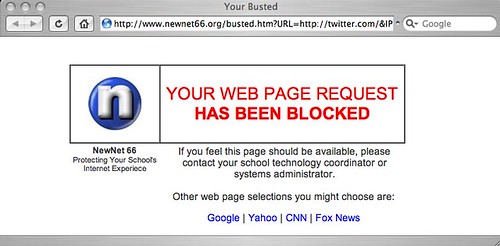
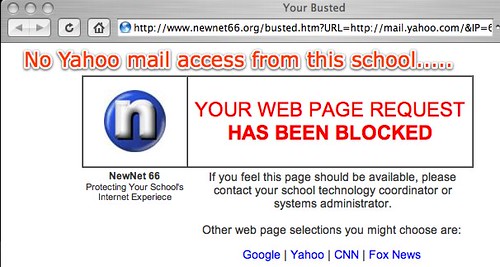
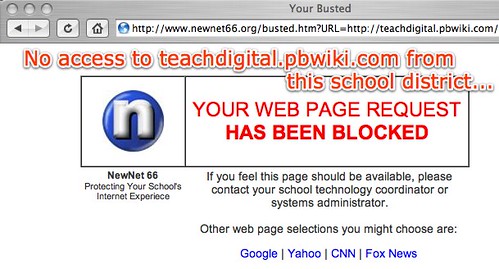
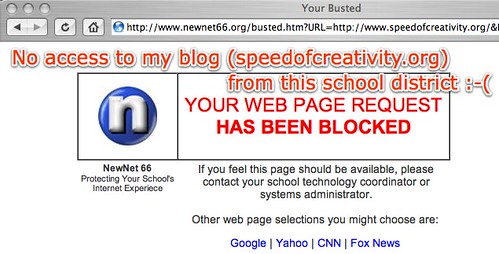
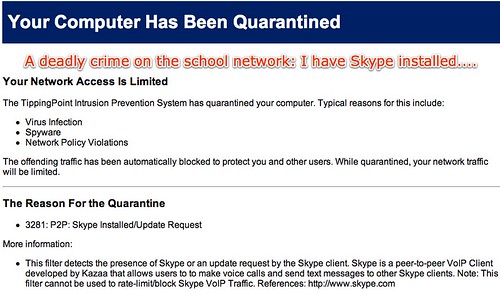

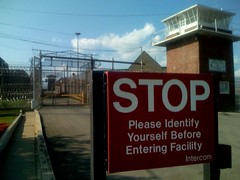


Comments
13 responses to “Content Filtering in Schools: Striving to CONTROL user behavior”
For several years I have asked the courage-adverse membership organization that is supposed to represent technology-using educators, ISTE, to issue a statement about what the user experience should be for teachers AND students when they use a computer in school. So far, ISTE has been too busy selling lists of standards for the victims of these misguided, anti-democratic networking policies.
If ISTE won’t protect its members from networking practices created by paraprofessional control freaks, then the NEA and AFT should do so. Treating professional educators like imbeciles or felons is unacceptable, is wreaking havoc on the educational process and is a serious issue of working conditions. (Can you imagine a job action over Internet filtering?)
The problem Wes describes and thousands of educators experience ever day not only wastes money and cheats kids, but represents a failure of leadership from the national organizations down to the school site principal. Do the network support personnel work for the teachers or do the teachers work for them? This power grab is unprecedented and must be stopped.
It is often my experience that the computers work better right out of the box, and have more functionality, than after the IT Department gets done “fixing” them. In this case, configuration is much closer in spirit to neutering.
If your job is made more difficult by insane networking policies, speak up, attend board meetings, write letters to the editor, ask Don Knezek to speak on your behalf and don’t pretend in front of your students that the crippled net in school represents the world.
I never expect to get online in a school, but I have an enormous bag of tricks containing constructive ways to use computers without being online. The kids can get online in more rational places, like car washes and Starbucks if need be.
Wes,
This is a VERY frustrating topic. Battling with the “fence-guards” can be nerve-racking. Flickr is banned. del.icio.us is banned (after you set up tech links for TEACHERS of course.) You Tube was banned in ’84…or may have well have been.
I remember my high school years in a small, central Texas town, when they boarded up the windows! Today we have boarded up Windows XP, but you can still peak through the cracks if you try, when the screen is not blue or the sky is not grey. 🙂 Ugh. Isn’t Technology fun? 🙂
[…] I read a couple of posts today about blocking content I realize I’m blessed to work with an IT department […]
Wes,
I think we should have a contest to see who has the most inane page come up when a site it blocked. Our’s includes a smiling stop sign waving at me.
Wes, one thing I’m curious about is exactly why this is happening. Are the IT folks that run these things that out of touch, does it come from policymakers above them that are uninformed, are there logistical issues at hand that are being glossed over, or is it a combination?
My grad degree is in marketing and one thing that was always drilled into us was to know your customer. The IT folks exist to serve (and support) the instruction in the classroom. I don’t teach K-12, but my wife does, ergo I can’t speak from first person experiences: but it would seem that the larger problem here might be who exists to serve who?
-D
Welcome to my world.
Your flikr photos never come through. All the wiki links do not work. The slide share for the K12 conference is blank. Trying to network, to share and gather ideas, expand the horizons for students and access is denied.
Frustrating.
AMB
Andrew: Your blog is blocked from the school where I am today– all blogger sites are blocked. Your comment makes me wonder if there is a service not blocked by most schools that provides for access to a “web feed” via it’s own channel, like a proxy channel. Most schools are vigorously blocking all known proxy paths to Internet content so I would guess the answer is no… It would be great if you could use a service like Yahoo Pipes and if that feed address was accessible, all the content coming through that feed would also be accessible. I don’t know of a solution that provides that functionality, unfortunately.
Danny, I think this is a cultural phenomenon which involves IT but also involves school administrations. In the business world as well as (sadly) the education world, many IT departments measure success by minimizing trouble tickets. (Sylvia Martinez pointed this out at TCEA last year.) By conservatively filtering and censoring Internet access, I think many IT departments reasonably believe they are contributing to measurable success by minimizing complaints and trouble ticket calls from parents, teachers, and others. Same thing goes for administrators. Leaders of bureaucracies (large and small) often tend to be reactive to “squeaky wheel complainers.” So I think part of the answer to your question is cultural, which is why this is a pervasive issue and difficult to address.
I’ve written on the issue you address, questioning whether or not IT departments are serving their constituents or serving themselves, previously in 1999 in the article “Wagging the Dog in Educational Technology: Elevating ‘IT’ Into the Classroom.” I was a fourth grade classroom teacher at the time I wrote that, it was NOT well received by my local school district administration (including the superintendent.) This is an important issue to consider. In the classroom as well as the IT department, it is easy to do what is CONVENIENT rather than what is best for students or teachers. (Darren Draper told me that quotation last summer at NECC, I think his Tech Director displays that saying prominently in his office.)
In addition to wanting to minimize complaints and trouble tickets, I think schools have fundamental problems with the basic characteristics of the read/write web. This is further exemplified for me today by the fact that I cannot search Google for the word “blog” on the school network where I’m working this morning.
The idea that students could write their own ideas, publish their voice, to the Internet is inherently disruptive and perceived as threatening by traditional school authorities in many ways. Citizen journalists in countries without democratically elected governments (China, Burma, etc) are seen as threats as well.
I agree with your point that IT departments should serve their constituents and meet their needs. Often this comes down to issues of leadership. What is the school district’s superintendent and school board’s vision of education, teaching and learning? Do they understand the importance of helping students learn to safety socially network online, publish their ideas, etc? This issue is multifaceted for sure, and I don’t have all the answers. I am certainly on a quest for ways to constructively address these dynamics in schools, however.
I diagnose the problem as school leaders who abdicate their responsibility for anything requiring electricity. They then hire IT control-freaks available to work in schools (that’s a biggie) who think they are in-charge and nobody tells them otherwise.
The number of stupid rules and policies I’ve experienced could fill a coffee table book.
Here is an article I wrote on the subject in 2002, entitled “Why Teachers Don’t Use Computers.”
http://www2.districtadministration.com/viewarticle.aspx?articleid=884
BTW: Does anyone agree with me that this is a labor issue?
[…] your head in dismay at this latest posting from Moving at the Speed of Creativity. Wesley Fryer shows, and you can see, what shows up on his screen as he is giving a workshop in a […]
Wesley,
Strange things as RSS is open and I can use Google Reader to access blog textual content. I am able to post to my blog via blogger but can not view said blog due to the Two Trees filtering network at our institution.
We spoke about the ability to teach students to be safe and effective citizens and living in a digital age and yet with the Web 2.0 revolution we can not teach via the tools provided to us free of charge.
Fantastic post, Wes, and excellent comments as well. I just forwarded it to my school’s group Diigo account, so it will pop into all their mailboxes.
Lots of buzz about this issue. I’m tagging it censorship and education on del.icou.us. robertogreco, a reader on my own post a few days ago about a filtering debate in my own 1:1 Apple school, left a links-rich comment that I’ll quote here:
“This problem with filtering is not unique to school cultures and ultimately just creates an incentive to waste valuable time finding work-arounds. It really all boils down to trust. See
this post from Chris Anderson http://tinyurl.com/22zl5h
and this summary of his talk at the Microsoft Global CIO Summit courtesy of Ross Mayfield:
http://tinyurl.com/25ar5g
for choice quotes like these:
“Don’t make people jump through a lot of hoops, the cost of experimentation is free.
“Everything is forbidden unless it is permitted” vs. “Everything is permitted unless it is forbidden.”
“…The old idea of IT determining what is appropriate prevents experimentation at the edges…The terrifying conclusion to all this is that we may have to trust our employees.
“Thanks to David Smith for pointing me to them:
http://tinyurl.com/yrpyoj“
I agree with every point you made. My school is also using filtering programs…my school uses Websense and they have blocked over 60%(exaggeration) of the web, such websites include Google images, YouTube, and the other day I search the name Paul Thacker and the page got blocked because the name had the word “hacker” in it. Also, I am involved in graphic arts classes at my school, and not being able to use any image website has severly restricted our productivity, and has limited us to finding images at home saving them to a flash drive, and hoping they work for the project we are doing. Aside from just Google Images, all image websites including Yahoo! Images and DeviantArt have been blocked.
–MIKE–
Also, our school has found nearly all the proxy servers that our student body know about and has obviously blocked them all.
My experience as a substitute teacher at a tech-oriented charter has really brought home to me why, at this point, homeschooling makes far more sense for anyone who can manage it. You can have all the technology you want, but if kids experience constant frustration, the stuttering of blocking, an inability to do meaningful research–well, then what’s the point? So on top of the near-immediate obsolescence of hardware (which does nothing to encourage school boards to spend on updates), the extraordinary rarity of 1:1 schools (which is really the only way to make ICT meaningful), there is this overwhelming censorship, which just clinches it.
A decent computer at home, with full access to the WWW (along with knowledgeable guidance), provides more of an education than any school in the USA now can. And it’s making homeschooling increasingly possible, since the access to excellent free materials only grows.